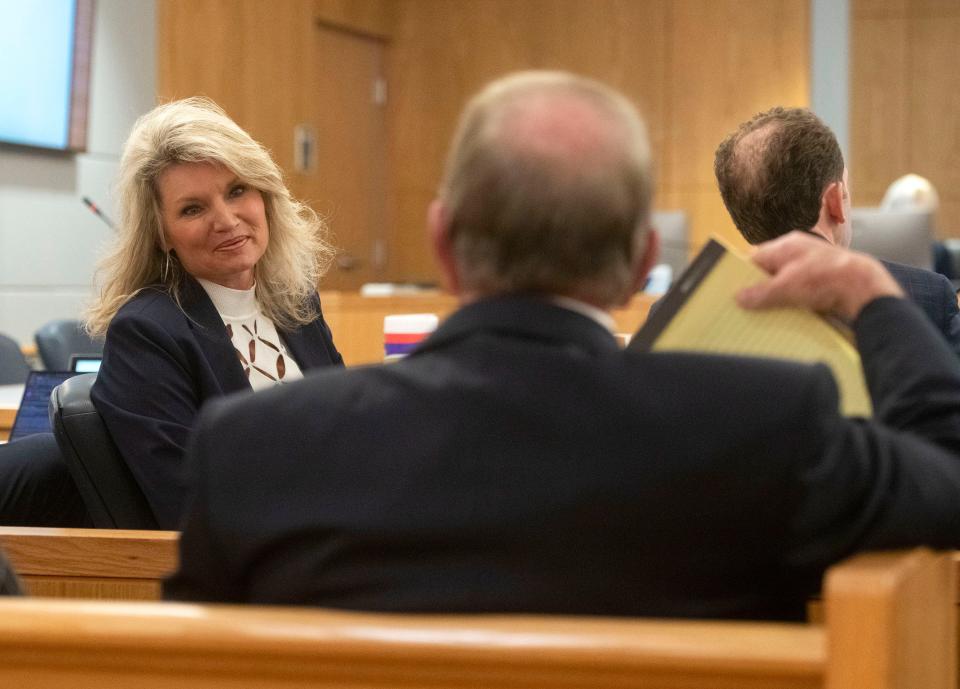Escambia County v. Pam Childers trial questions 'purpose' of lucrative retirement plan
Escambia County Commissioner Steven Barry was the first to testify Monday in the opening day of the trial between the Escambia County Commission and Escambia County Clerk of Court and Comptroller Pam Childers over her contention that the county's local retirement plan for commissioners is illegal.
At one point during his testimony, Barry was asked by Childers' attorney, Ed Fleming, if he could name a public purpose for having a local retirement plan for commissioners with more than 3.7 times the contribution rate as the Florida Retirement System plans.
Barry testified that it made sense for the plan's public purpose to be used as a recruiting tool for senior-management level officials in the county, such as directors and administrators, a point Childers said she agreed with later in her testimony. However, when asked if he could name a public purpose for elected commissioners participating in the lucrative plan, Barry did not answer the question directly.
"I don't know exactly what you're getting at," Barry said in response to the question.
Childers hasn't blocked payments for senior-level officials, only for elected officials, because she contends their pay must be set by law and the local retirement plan doesn't meet the requirements under the law.
Escambia County sued Childers in 2022 to force her to authorize the payments, arguing the retirement program was indeed authorized under a Florida law passed in the late 1990s and that Childers lacked the authority to block the payments.
In 2023, an Escambia County commissioner participating in the traditional Florida Retirement System would end up with $14,461.43 in their retirement account, which includes 3% of their paycheck.
If Childers had allowed the payments to the local retirement plan in 2023, an Escambia County commissioner in that plan would have ended up with $54,485.11 in their retirement account, which doesn't include any contribution from their paycheck.
Attorney William Cash, representing Escambia County, did not make an opening argument at the start of the trial on Monday, preferring to reserve his full argument for the closing of the trial after all witnesses have testified.
Fleming said in his opening argument that Childers did not make the decision to block the payments lightly and that "she gave every opportunity in the world" for the county to make the case that it was legal before she blocked the payment.

Barry testified when he was elected in 2012, he asked about the plan but was told, "It just means you're not in the FRS, and nobody does that." Barry said it wasn't until 2019, when he saw Commissioner Robert Bender's financial disclosure form filed with the state and the large amount in his county retirement plan, that he learned the details of the local plan.
Barry said he went to County Attorney Alison Rogers, not the county's Human Resources department. That eventually evolved into Barry requesting the county legal department to ask the Ethics Commission if the County Commission could discuss a backpay settlement with commissioners he said weren't fully told about the program.
Barry's proposed backpay settlement discussion is what exploded the local retirement plan into a public controversy in 2021. It came at a tumultuous time within upper levels of county government. At the same meeting the commission discussed the retirement plan, the commission also voted to put then County Administrator Janice Gilley on notice that her contract was up for consideration. Two weeks later, the commission voted to fire Gilley.
Barry, who recommended Gilley for the position, said he was close to her before she became administrator and that she was fired for "lack of performance."
"She and I never had a bad conversation or heated argument," Barry said.
Gilley is expected to testify later in the trial.
Childers also took the stand, and county attorneys spent a considerable amount of time evaluating the timeline of when Childers decided the plan was illegal.
Previously: Escambia County lawsuit on controversial commissioner retirement program will go to trial
Childers testified that she personally decided it was illegal in June 2021 and capped the contribution to be equal to the Florida Retirement System while she sought the opinions of attorneys to have discussions with county officials about the plan. In December, she sent a notice that she would not be authorizing payments altogether beginning Jan. 1, 2022.
Cash questioned comments Childers made to media outlets in June 2021 saying said she had been looking into the issue a year. Childers said those comments were related to senior-level management employees who began enrolling the program in larger numbers after Gilley became administrator.
Cash asked if she was personal friends with Gilley and began a series of questions implying Childer's motivation to block the payments was because of a personal animus she had for the commissioners over the firing of Gilley and derogatory comments commissioners were alleged to have made about Childer after a June 2021 meeting.
Childers said she considers Gilley "a professional friend" and doesn't regularly communicate with her. Before questions could go further, Childers' attorneys objected, saying whatever Childers thinks of the commissioners has no bearing on the legality of Childers' actions.
Okaloosa Judge William Stone said at this point in the case, any line of questioning on the issue wouldn't help him decide the key issue of the case, which is whether the local retirement plan is legal or illegal.
The trial is expected to be complete by Thursday. Since the trial is a civil bench trial where the judge is the sole decider of fact, it's up to Stone whether to issue a ruling from the courtroom at the end of the trial or wait to issue a written ruling.
This article originally appeared on Pensacola News Journal: Escambia County v. Pam Childers trail begins with Barry testimony

